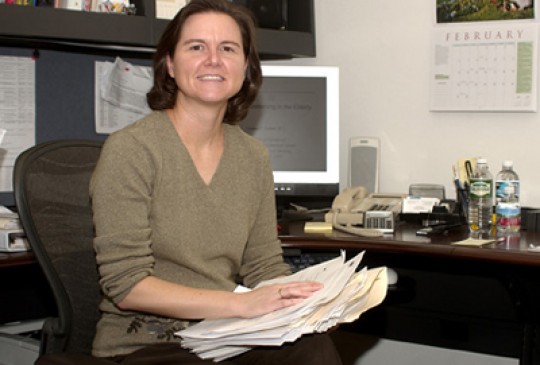Prostate Cancer Screenings at VA Hospitals Don’t Follow Guidelines for Elderly, Study Says
Prostate Cancer Screenings at VA Hospitals Don’t Follow Guidelines for Elderly, Study Says
Veterans Affairs hospitals screen elderly men with limited life expectancies for prostate cancer at surprisingly high rates, even though guidelines recommend against such screening, according to a study led by a physician at the UCSF-affiliated San Francisco VA Medical Center (SFVAMC).
 Louise C. Walter, MD, is a a geriatrician at the UCSF-affiliated San Francisco Veterans Affairs Medical Center.
Louise C. Walter, MD, is a a geriatrician at the UCSF-affiliated San Francisco Veterans Affairs Medical Center.
“Some VA hospitals are screening up to four fifths of their very ill, very elderly patients, and some as few as one quarter, but none are targeting screening according to the men’s life expectancy,” said principal investigator Louise C. Walter, MD, a geriatrician at SFVAMC and a professor of medicine at UCSF.
The study of 622,262 men at 104 VA medical centers around the country was published electronically in the Journal of General Internal Medicine on Dec. 17, 2011.
The authors found that, nationally, an average of 45 percent of men over age 85 or with four or more serious diseases were given a prostate-specific antigen (PSA) screening test. Screening rates at individual medical centers ranged from 25 percent to 79 percent.
The screening rate you would expect to see for men with limited life expectancy is zero to 20 percent,” said Walter. “No medical center we looked at was in that category.”
Walter noted that the latest guidelines from the U.S. Preventive Services Task Force recommend that men 75 years or older should not be given the PSA screening test because the harms, such as false positive results and unnecessary medical treatments, outweigh the benefits.
The study found that healthy older men with longer life expectancies were screened at the same rates as frail, ill men. “Low or high, a hospital’s screening rate had nothing to do with whether the men were sick or well,” said Walter. “As geriatricians well know, some elders are quite healthy and might benefit from screening, while others are quite ill and will not. Decisions about screening and other medical procedures for older patients need to be made on an individual basis.”
The study authors recommend new interventions at VA medical centers to reduce inappropriate PSA screening in elderly men, as well as new communication tools to help elderly men weigh the benefits and harms of screening.
VA Hospitals Benefit From University Connection
Walter emphasized that the study was not meant as a criticism of the VA. “In fact, the reason we chose the VA for this study was that it is the only medical system in the country in which you can look at these records at the national level,” she said. “No other health care system has integrated electronic records like the VA’s. They can measure a problem and fix it, which is the beauty of the system.”
According to the study, VA hospitals associated with academic medical centers tended to have lower screening rates. “This has been shown before,” said Walter. “Studies indicate that a university connection encourages both a stronger culture of evidence-based medicine and a weaker malpractice culture, with fewer doctors practicing defensive medicine.”
The researchers also found that hospitals in the southern United States, and hospitals with a higher ratio of nurse practitioners and physicians’ assistants, were likely to have higher screening rates.
Other studies have shown higher screening rates in the South, say the authors, who speculate that the disparity may be attributable to “regional differences in physician attitudes about resource allocation,” which are reflected in higher health care expenditures generally and a more prevalent belief in the effectiveness of PSA screening than in other areas of the country.
The association between a higher ratio of mid-level health care providers and higher screening rates is harder to explain, they say, but may indicate limited hospital resources or high patient load, resulting in less rigorous application of screening guidelines.
Co-authors of the study are Cynthia So, MPH, of UCSF; Katharine A. Kirby, MS, and Kala Mehta, DSc, MPH, of SFVAMC and UCSF; Richard M. Hoffman, MD, MPH, of New Mexico VA Health Care System and the University of New Mexico; Adam A. Powell, PhD, MBA, of the Minneapolis VA Health Care System and the University of Minnesota; Stephen J. Freedland, MD, of Durham VA Medical Center and Duke University, NC; Brenda Sirovich, MD of White River Junction VA, VT; and Elizabeth M. Yano, PhD, MSPH, of the VA Greater Los Angeles Health System and UCLA.
The study was supported by funds from the National Institutes of Health, the American Federation for Aging Research, the National Institute on Aging and the Department of Veterans Affairs. Some of the funds were administered by the Northern California Institute for Research and Education.
NCIRE – The Veterans Health Research Institute – is the largest research institute associated with a VA medical center. Its mission is to improve the health and well-being of veterans and the general public by supporting a world-class biomedical research program conducted by the UCSF faculty at SFVAMC.
SFVAMC has the largest medical research program in the national VA system, with more than 200 research scientists, all of whom are faculty members at UCSF.
UCSF is a leading university dedicated to promoting health worldwide through advanced biomedical research, graduate-level education in the life sciences and health professions, and excellence in patient care.
By Steve Tokar
University of California, San Francisco (UCSF)
###
> About University of California, San Francisco (UCSF).
The University of California, San Francisco (UCSF) is a leading university dedicated to promoting health worldwide through advanced biomedical research, graduate-level education in the life sciences and health professions, and excellence in patient care. It is the only UC campus in the 10-campus system dedicated exclusively to the health sciences.
More about University of California, San Francisco (UCSF).
More about University of California, San Francisco (UCSF). Information.
###
* The above story is adapted from materials provided by University of California, San Francisco (UCSF)
________________________________________________________________




















